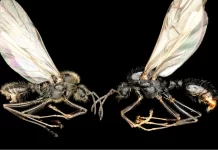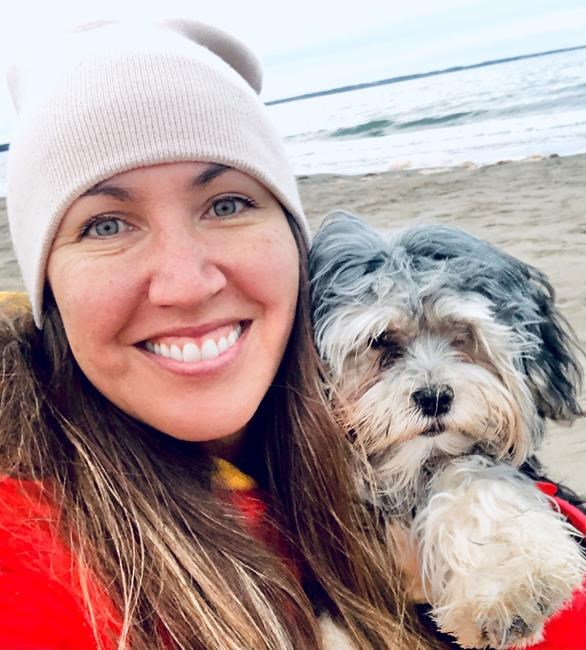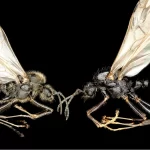Angela Gevaudan recalls the first year after her RCMP-officer husband was killed on duty as a whirlwind of responsibility and emotion that offered her little time to process her grief and loss.
Const. Fabrice Gevaudan was one of three Mounties shot and killed during a gunman’s rampage in Moncton, N.B., in June 2014. In the aftermath, investigations and reviews were launched, memorial services were held and life-size statues commissioned.
Angela was there for all of it, representing her late husband and their family, even as she worked to keep paying the bills while trying to support the couple’s daughter in her own grief.
“So it was early on that I went into survival mode,” she says. “And it took a long time for me to really allow myself to fully experience this as a personal loss, as the loss of a spouse.”
More than six years later, Gevaudan is still working through her grief. Which is why she and a handful of other women who have lost spouses in uniform are coming together at a Toronto-area hotel to talk about their shared experiences and try to heal.
“This will finally be an opportunity for me and for the other participants to really focus on ourselves, and to have a space that is safe to do so.”
The gathering is the first iteration of a support program created by Wounded Warriors Canada, an organization that provides mental-health services to first responders and veterans, to help Canadians whose spouses have been killed in the line of duty or by suicide.
Wounded Warriors executive director Scott Maxwell says the program combines peer support with professionally trained therapists, a version of which has been used to help veterans deal with psychological trauma.
“I’ve heard from spouses who have lost their spouse as a result of their service to Canada for a long time now saying: `I’ve tried this, I went here, I’ve looked there, there’s nothing culturally appropriate for what I’ve been going through,”’ Maxwell says.
There is a common misconception that grief is linear, says Gevaudan, but “it’s not like there’s a starting point and a finish line and you just keep working towards it and done.” There is also the ever-present risk of new trauma as events such as other police shootings hit close to home.
Gevaudan says she was particularly affected by last year’s mass shooting in Nova Scotia in which a gunman killed 22 people, including RCMP Const. Heidi Stevenson.
“We can all be impacted by trauma, but some of us are injured, so … we’re more susceptible to further injuries,” she says. “It’s part of it that makes it more difficult to rebuild your life and feel some sense of normalcy.”
Maxwell says that has also been a common experience for spouses of fallen first responders and veterans, who are often left to pick up the pieces on their own after the initial waves of public attention and outpouring of sympathies and support have subsided.
“The common refrain is: `People keep telling me it’s going to get better, but I feel the opposite,”’ Maxwell says. “And they often feel unsupported in terms of the tools that they would need to process and manage all these things.”
The RCMP says bereavement counselling is available to the families of officers who have died while on duty or through suicide. That includes therapy and case management until family members have “the tools needed to deal with the grief on a go-forward basis.”
Yet while she has been able to access some mental-health support since her husband was killed, Gevaudan says it hasn’t always been easy. She says there was a period when promised support from the government was cut off for more than a year before it was eventually restored.
That left a mark, including persistent fears that her support could be cut off again.
“One of the things they say is that we’re not to worry ourselves with expectations, and that they’ll always be here to support us,” she says. “But that’s so far from what it has been like for us.”
Many of her late husband’s colleagues and other members of the community have also tried to provide what assistance they can, for which Gevaudan says she is extremely grateful.
Yet she says most people can’t understand or relate to the unique experience that comes with having lost her husband in the line of duty, and that she is looking forward to meeting other women who understand her pain and talking to them with the help of trained therapists.
Not only is the combination of peer support and therapists in one forum one of the unique aspects of the Wounded Warriors program, Gevaudan suggests the presence of those mental-health workers will be critical.
“Every chance that you have to sort through anything, whether it’s a memory or a physical item or any of it, it just brings up other things and that allows you to process something else,” she says.
































